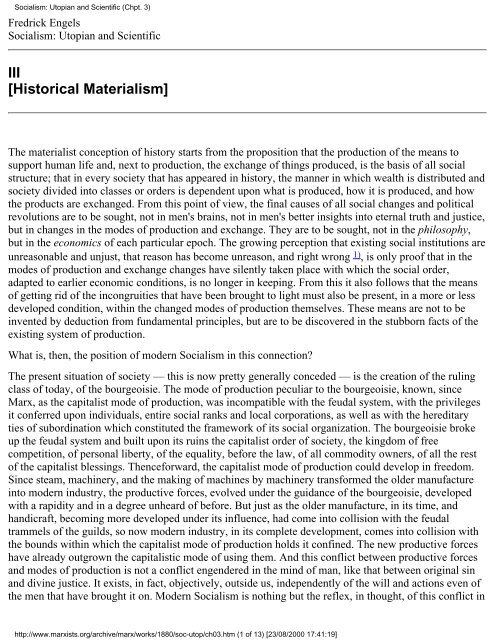Socialism: Utopian and Scientific - MIA
Socialism: Utopian and Scientific - MIA
Socialism: Utopian and Scientific - MIA
You also want an ePaper? Increase the reach of your titles
YUMPU automatically turns print PDFs into web optimized ePapers that Google loves.
<strong>Socialism</strong>: <strong>Utopian</strong> <strong>and</strong> <strong>Scientific</strong> (Chpt. 3)Fredrick Engels<strong>Socialism</strong>: <strong>Utopian</strong> <strong>and</strong> <strong>Scientific</strong>III[Historical Materialism]The materialist conception of history starts from the proposition that the production of the means tosupport human life <strong>and</strong>, next to production, the exchange of things produced, is the basis of all socialstructure; that in every society that has appeared in history, the manner in which wealth is distributed <strong>and</strong>society divided into classes or orders is dependent upon what is produced, how it is produced, <strong>and</strong> howthe products are exchanged. From this point of view, the final causes of all social changes <strong>and</strong> politicalrevolutions are to be sought, not in men's brains, not in men's better insights into eternal truth <strong>and</strong> justice,but in changes in the modes of production <strong>and</strong> exchange. They are to be sought, not in the philosophy,but in the economics of each particular epoch. The growing perception that existing social institutions areunreasonable <strong>and</strong> unjust, that reason has become unreason, <strong>and</strong> right wrong 1) , is only proof that in themodes of production <strong>and</strong> exchange changes have silently taken place with which the social order,adapted to earlier economic conditions, is no longer in keeping. From this it also follows that the meansof getting rid of the incongruities that have been brought to light must also be present, in a more or lessdeveloped condition, within the changed modes of production themselves. These means are not to beinvented by deduction from fundamental principles, but are to be discovered in the stubborn facts of theexisting system of production.What is, then, the position of modern <strong>Socialism</strong> in this connection?The present situation of society — this is now pretty generally conceded — is the creation of the rulingclass of today, of the bourgeoisie. The mode of production peculiar to the bourgeoisie, known, sinceMarx, as the capitalist mode of production, was incompatible with the feudal system, with the privilegesit conferred upon individuals, entire social ranks <strong>and</strong> local corporations, as well as with the hereditaryties of subordination which constituted the framework of its social organization. The bourgeoisie brokeup the feudal system <strong>and</strong> built upon its ruins the capitalist order of society, the kingdom of freecompetition, of personal liberty, of the equality, before the law, of all commodity owners, of all the restof the capitalist blessings. Thenceforward, the capitalist mode of production could develop in freedom.Since steam, machinery, <strong>and</strong> the making of machines by machinery transformed the older manufactureinto modern industry, the productive forces, evolved under the guidance of the bourgeoisie, developedwith a rapidity <strong>and</strong> in a degree unheard of before. But just as the older manufacture, in its time, <strong>and</strong>h<strong>and</strong>icraft, becoming more developed under its influence, had come into collision with the feudaltrammels of the guilds, so now modern industry, in its complete development, comes into collision withthe bounds within which the capitalist mode of production holds it confined. The new productive forceshave already outgrown the capitalistic mode of using them. And this conflict between productive forces<strong>and</strong> modes of production is not a conflict engendered in the mind of man, like that between original sin<strong>and</strong> divine justice. It exists, in fact, objectively, outside us, independently of the will <strong>and</strong> actions even ofthe men that have brought it on. Modern <strong>Socialism</strong> is nothing but the reflex, in thought, of this conflict inhttp://www.marxists.org/archive/marx/works/1880/soc-utop/ch03.htm (1 of 13) [23/08/2000 17:41:19]














![tyf Enf=O=n]lgg](https://img.yumpu.com/47584932/1/190x245/tyf-enfonlgg.jpg?quality=85)

